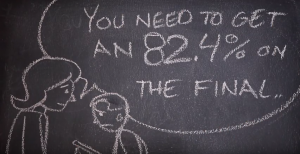For the past hundred years, the grading system has been the same: a scale of points from 0-100. Sixty of those points are dedicated to the failure portion, while the rest are divided by increments of ten to represent letter grades. Parents, grandparents, great-grandparents —all generations of students have gone through this same system.

However, new questions are being raised based on the functionality and thoroughness of the old grading system. At the beginning of this school year, Principal Stephen Imbusch sent out some thoughts in his weekly e-Notes regarding the grading system and refuted some of the statements that defend the traditional grading system. Additionally, Imbusch spoke about standards based grading at the School Committee Meeting on Jan. 28. At the meeting, Imbusch clarified his ideas and explained his goal of making sure students are not just being motivated to achieve a higher grade. He also proposed the idea of supplementing report cards with additional information beyond just grades in hopes of expanding the focus students and parents put on receiving high grades.
One popular argument that defends the conventional grading system is that grades show whether or not a child is learning, but Imbusch argues that the opposite is true. In one of his e-Notes, Imbusch attached a YouTube video by ActiveGrade that explained standards-based grading. The video discusses that while the long-established grading system has functioned well enough for the past century, it fails to break down a student’s performance to assess where they need improvement.
“The 82% that your child has… tells you very little. It certainly tells you nothing about the concepts your child is struggling with, or where they are finding success,” said Imbusch.
Additionally, Imbusch discussed how many people believe that grades tell us who is working hard. In his e-Notes, Imbusch refuted the argument. “Sure they do, but they certainly do not paint the full picture,” Imbusch said. “We have been working very hard at WHS over the past few years to ensure that the grade a student receives is a true reflection of their knowledge and skill.”
Another prevalent argument for the older grading system is that without grades, there is no rigor in the students, but Imbusch observes that the opposite is usually true. Imbusch even claims that sometimes, grades even destroy vigor, as bad grades discourage students from continuing to work hard if they do not get the results they want.
While it is true that colleges require grades to compare students side by side for the admissions process, Imbusch explains that from experience, he sees that the competition between students does not always produce positive results.
“We don’t need to compare our students to one another using grades,” said Imbusch. “We need to ensure that every child reaches proficiency in that particular area of study.”
For this reason, Imbusch abandoned the old tradition of class rank, as comparing students can be degrading to those who receive lower grades. Even after years of implementing the idea of reaching the honor roll, Imbusch says he has seen students come to his office asking to move their grade from a 79 to an 80 or an 89 to a 90. This obsession with grades leads him to believe that the honor roll should been done away with as well.
Many argue that because colleges have a Dean’s list, high schools should continue to have an honor roll; however, Imbusch thinks differently.
“If we did everything the same as colleges do them, I would be fired,” said Imbusch. “The average college dropout rate is 53%, and that would be unacceptable in a public high school.”
The argument mimics the same situation that occurred over the termination of midyears just last year.
In addition, as students look to getting on the honor roll and getting exceptional grades, many tend to lose focus on what the meaning of a grade is. Imbusch sees this hyper focus on grades as a hinderance on the learning process, as students try to get good grades rather than genuinely obtain and retain knowledge.
While no specific plans are in place to make immediate changes, Imbusch would like to see some changes occur in the future regarding how the grading system functions in order to provide the best learning opportunities for students.
“Our current grading system is similar to this ‘stamp of approval’, which I would argue is a vestige of the past, and totally inadequate feedback for students today, who we expect to find success in the 21st Century,” said Imbusch.














